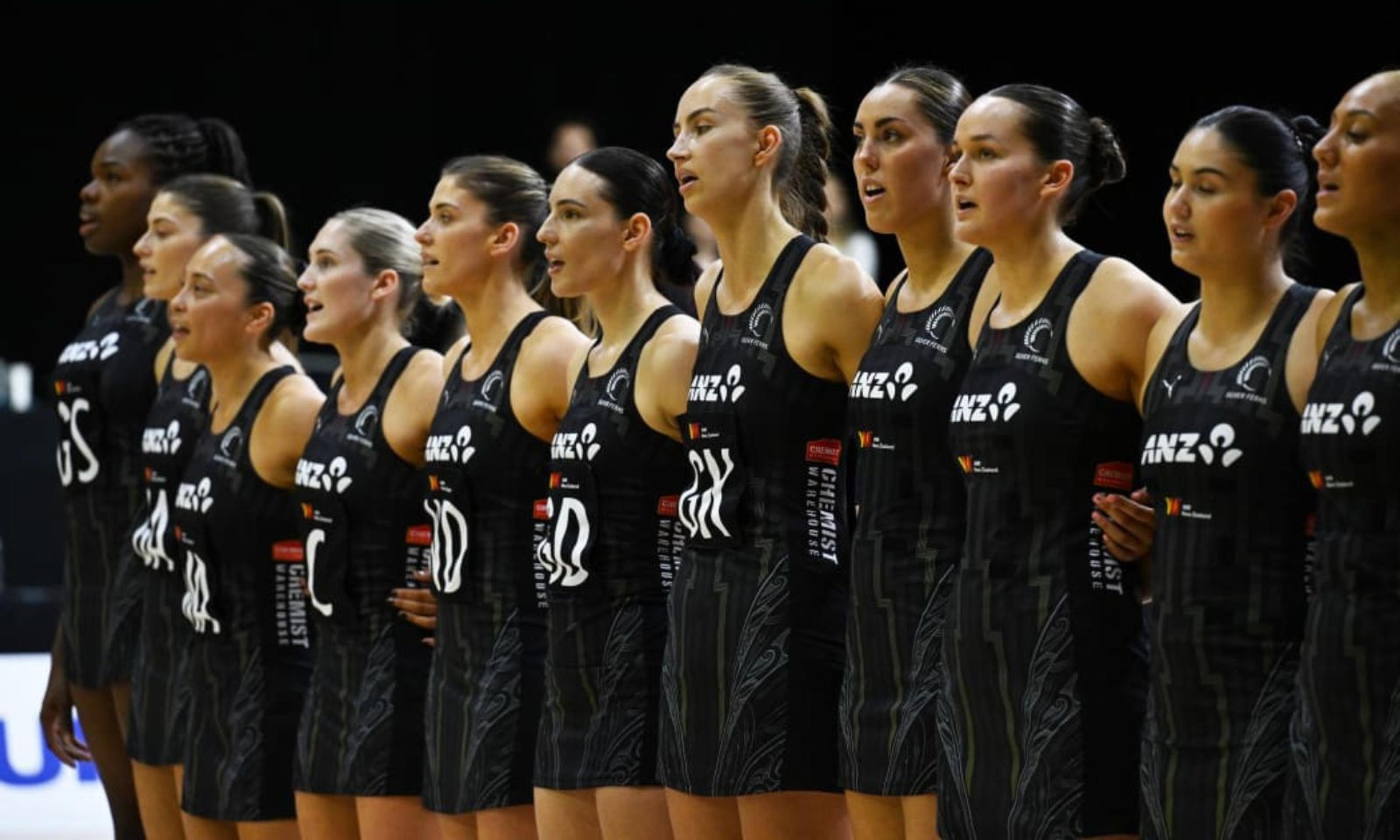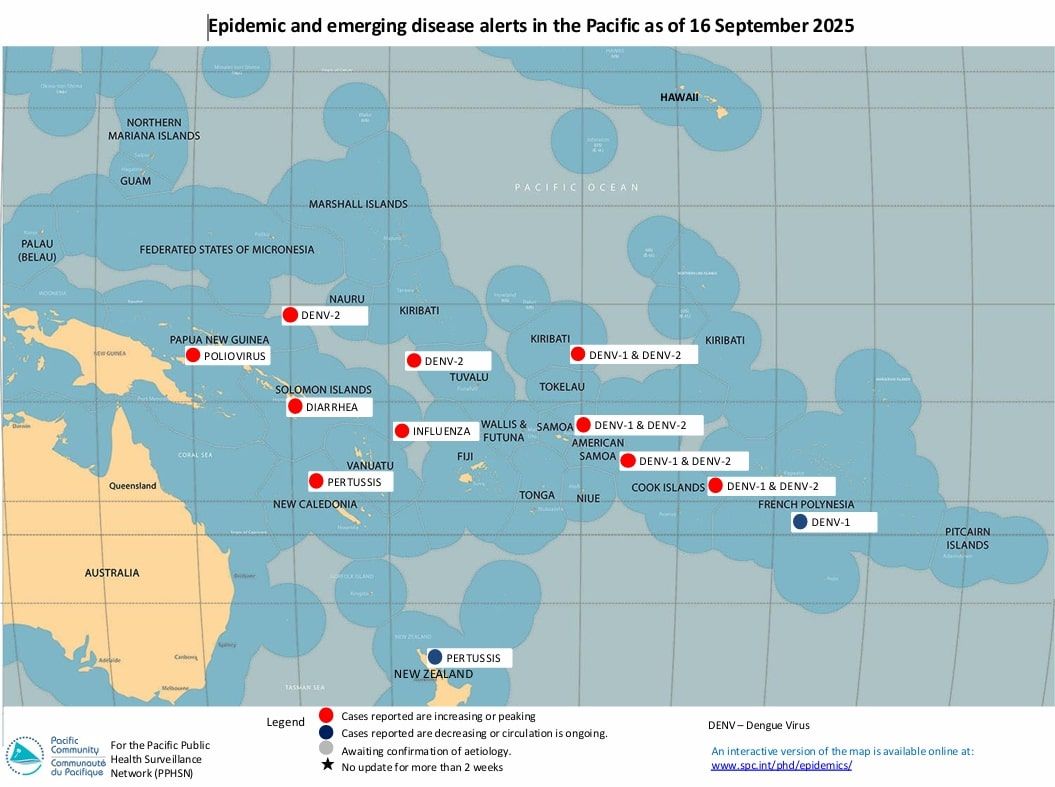

Clean-up Sāmoa: The Sāmoan National Emergency Operation Centre has undertaken a national dengue fever fumigation campaign across schools in the country.
Photo/Government of Sāmoa
Record dengue fever outbreaks challenge Pacific health systems
Despite international assistance and local clean-up efforts, communities face ongoing risks as extreme weather conditions worsen the situation.


Inked across lands: How Pacific tattoo art is thriving in Germany

US funding cuts threaten to 'dry up' future of Pacific scientists - expert



Inked across lands: How Pacific tattoo art is thriving in Germany

US funding cuts threaten to 'dry up' future of Pacific scientists - expert

Dengue fever continues to surge across the Pacific, reaching record levels and pushing health systems to their limits.
Since January, more than 16,500 cases and at least 17 deaths have been reported in the region, according to the Pacific Syndromic Surveillance System (PSSS), which works with the World Health Organization (WHO).
Fiji, Sāmoa, and Tonga have been the hardest hit, but outbreaks have also been declared in American Sāmoa, the Cook Islands, Nauru, Tuvalu, and French Polynesia.
In Fiji, the Ministry of Health and Medical Services declared the outbreak over on 8 August 2025 after a major decline in cases in the Western and Central divisions. The outbreak began in February 2025 in the west and spread to the Central Division by late April, with around 11,599 cases reported nationwide.
The Fijian authorities caution that dengue remains endemic and continues to pose a risk.
Polynesia is bearing the brunt of this recent wave.
Sāmoa declared an outbreak on 17 April, reporting more than 12,800 clinically diagnosed cases and six deaths. Children under 15 account for nearly three-quarters of infections.
Tonga has reported over 800 cases and three deaths, while the Cook Islands confirmed 137 cases in Rarotonga, mostly among teenagers.
French Polynesia logged more than 2290 cases since late 2023, although the numbers have recently decreased.
Listen to Dr Api Talemaitoga's interview with Ala Vailala below.
In Melanesia, Papua New Guinea, the Solomon Islands, and Vanuatu have reported sporadic cases. But Fiji carries the biggest burden.
Extreme weather linked to climate change, including heavy rains, floods, and longer hot seasons, expands mosquito-breeding grounds and prolongs transmission periods, health officials state.
Experts warn that dengue is now a year-round threat in parts of the Pacific. Limited access to healthcare, equipment shortages, and gaps in disease surveillance mean that many infections go unreported.
Sāmoa, Tonga, and the Cook Islands have launched nationwide clean-up campaigns to eliminate mosquito-breeding sites, supported by targeted spraying.
The WHO and partner agencies are providing test kits, insecticides, and technical guidance.
New Zealand has deployed medical teams and $300,000 worth of supplies to Sāmoa, while Australia sent insecticides and laboratory support to Kiribati, Nauru, and Tuvalu.

Map showing current dengue outbreaks and areas where cases are decreasing across the Pacific, as of 16 September 2025. Photo/Pacific Public Health Surveillance Network
Scientists are trialling new mosquito control methods in French Polynesia. Despite these interventions, experts warn that responses remain reactive and fragmented.
“Current disease surveillance systems are rarely sufficient to manage dengue, as evidenced by the continual growth of dengue in the region,” Dr Bobby Reiner, a disease ecologist at the Institute for Health Metrics and Evaluation, University of Washington, told the Guardian.
For residents, the impact is severe: hospitals in Sāmoa and Fiji have, at times, been overwhelmed, suffering shortages of beds, trained staff, and supplies. Nauru confirmed 447 cases, including two teenage deaths, while dengue in Tuvalu affects children as young as three months.
Families often face high costs and disruptions when children or breadwinners are hospitalised. Access to care largely depends on location. Urban centres like Suva and Apia have strained but functioning services, whereas outer islands and rural settlements experience delays in treatment.
Experts emphasise that, beyond emergency measures, there needs to be stronger surveillance, better planning to reduce mosquito breeding, and investment in technologies to track outbreaks.
For now, dengue continues to test the resilience of Pacific communities. With climate change intensifying the risks associated with mosquito-borne disease, health systems across the region continue to face challenges in containing and preventing future outbreaks.